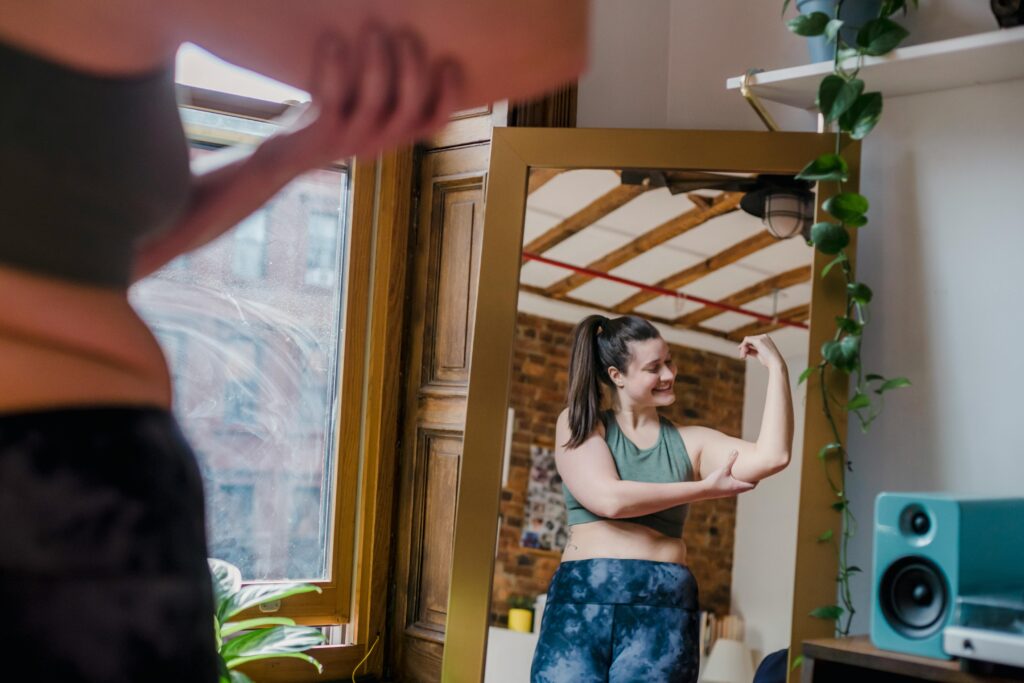What is that annoying voice telling you not to have any cookies before dinner? Judging your current pants size… comparing your size to your very active cousin. No, it’s not your mother, despite her comments can be a part of the problem too, but it’s diet culture. The dieting and weight loss industry in the USA alone is worth around $72 billion and yet over 80% of diets fail!
Dieting and weight shaming is everywhere and was especially hard-hitting from the advent of lockdowns in 2020. Queue the social media posts and challenges suggesting that we needed to “use this time to become better” by learning new languages, skills, starting a business and losing weight. How rude! Living a healthy lifestyle is important, but not defined by the number of a scale. And, with everything that has happened last year and this one, you’d think we would have learnt to address people and health much differently.

I’m personally a fan of snuggling up at home, watching my favourite shows and enjoying a giant bowl of popcorn and too many Oreos to count. Lockdowns and the anxiety that came with it made many of us seek more comfort in these small things. While 2020 was an unexpectedly strange and tough year for all of us, just like years before, our problems don’t just go away because someone tells us they should.
Diets have been around for decades, and diet culture promotes this very basic idea that because we lack control over our food choices it equates to weight gain and poor health. It shouts at us that we need to be “better” about food, calories and exercise to lose weight and to be in a thinner, stronger body. But if that were really true, and we have spent so much money on diets, wouldn’t we all be healthy and fit as fiddles?

Diet culture doesn’t care about ethnicity, cultural norms, the finances of an individual, the impact of the food environment, or the fact that nutrition while important, is just one of many factors that influence good health. It instead demonises entire food groups without sound scientific evidence, while telling you to swap something you enjoy for the popular new “superfood”. It belittles those who aren’t thin, promoting harsh perfectionist habits which can impact your relationship with your own body and food.
You don’t even have to be on a diet to subscribe to diet culture. Many diets can disguise themselves as lifestyles, making it an easier pill to swallow. I’m not talking about groups that have evidence-based reasons for their eating habits, such as religion, ethics, allergies and intolerances. I’m referring to any ‘lifestyle’ that makes you shy away from social events because of anxiety surrounding food or leads you to shop in expensive speciality stores for the most nutritious, organic, hand-reared foods. It’s elitist stuff like this which makes it more challenging to convince people that health isn’t fleeting and frivolous.
Social media is riddled with accounts promoting the healthiest recipes, food swaps, alternative sugars and do-good-for-all foods. And my personal favourite, the best detox blah blah. I’m a nutritionist, and I’ll just say it, but what’s wrong with having a regular Oreo? Why have we allowed the culture of dieting to ruin having normal food?

So now you’re probably wondering, how do I even spot diet culture?
Consider:
- Is it marketed as a ‘healthy alternative’?
- Is it a “diet” food or boasts about how many calories it has per serving?
- Does it promote ‘swap this for that’?
- Does it promote balance but excludes carbohydrates?
- Is weight-loss promoted primarily?
- Is it a meal plan specific to weight loss/detox/special features not yet discovered in humans?
- Does it state any diet buzzwords like clean eating, gluten-free (without the allergy), cheat meal, cleanse, etc?
- Is the primary goal aesthetic and may involve extreme or disordered behaviours like fasting?
- Does it shame or demonise certain foods or food groups?
- Does it suggest you have to earn your food through working out, equates food to calories-to- be-burned off?
- Does it promote itself as the ‘perfect diet’?

If you answered yes to any of those, then it quacks like Diet Culture.
As a registered nutrition professional, I know there is a lot of evidence suggesting that being of a higher weight puts individuals at higher risk of developing chronic diseases, especially within certain ethnic groups. But I also know that many factors can play a role in overall health. This is why non-diet approaches and person-centred care are really important. For example, sleep habits, work-related stress, economic stability all play roles in your health.
We can often be unaware of subtle messaging that promotes feelings of inadequacy about our own experiences with food and our bodies. With support from a non-diet or HAES-aligned registered nutritional professional, you can be on your way to being a diet-culture drop-out.
References and Resources
Crawford R. Healthism and the medicalization of everyday life. Int J Health Serv. 1980;10(3):365-88. doi: 10.2190/3H2H-3XJN-3KAY-G9NY. PMID: 7419309. https://pubmed.ncbi.nlm.nih.gov/7419309/
LaRosa, John. “Top 9 Things to Know About the Weight Loss Industry,” March 6, 2019. https://blog.marketresearch.com/u.s.-weight-loss-industry-grows-to-72-billion
Nolan Brown, Elizabeth. “When Healthy Living Goes Too Far”, November 20, 2013. Bustle. https://www.bustle.com/articles/9205-youve-heard-of-racism-and-sexism-but-what-about-healthism
Thomas, Laura. Just Eat It – How Intuitive Eating Can Help You You Get Your Shit Together around Food. Bluebird, 2019.
Evelyn Tribole, and Elyse Resch. Intuitive Eating A Revolutionary Anti-Diet Approach. 4th ed. St. Martin’s Essentials, 2020.
https://www.intuitiveeating.org/10-principles-of-intuitive-eating/
https://isarobinsonnutrition.co.uk/blog/what-is-diet-culture